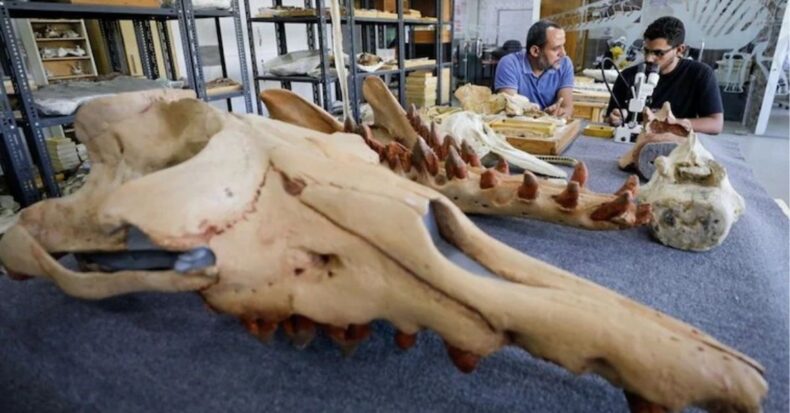On Wednesday, Scientists said that they have recently discovered a 43 million-year-old fossil of a previously unknown amphibious ancient four-legged whale in Egypt, which can help trace the transition of whales from land to sea.
The new Whale fossil has raised questions about ancient ecosystems and pointed research towards the origin and coexistence.
All about the Fossil
The fossil of the Whale was discovered from the middle Eocene rocks in the Fayum Depression in Egypt’s Western Desert near the town of El Mansoura, north of Cairo.
In a statement, the Egyptian-led researchers said that the 42 million-year-old fossil shows that the Whale belongs to the Protocetidae.
A group of extinct whales falls in the middle of that transition of Whales from land to sea.
This area was once covered by sea and has provided a vast stratum of discoveries showing whales’ evolution. It has also been studied at the Mansoura University Vertebrate Palaeontology Centre (MUVP).
The New Whale is called Phiomicetus Anubis. It had an estimated body length of nearly three meters or 10 feet and a total body mass of close to 600 kg or 1,300 lb.
According to scientists, it was probably a top predator, and its partial skeleton reveals that it is the most primitive protocetid whale known from Africa.
The genus name of this new Whale honors the Fayum Depression. The species name refers to the ancient canine-headed Egyptian god associated with mummification and the afterlife, Anubis.
There have been several discoveries and research in the past few years; however, the early whale evolution in Africa has largely remained unknown to the researchers.
Work has been going in the area to find more evidence that may help solve the mystery and provide new details regarding the evolutionary transition of whales from amphibious to fully aquatic whales.
A researcher at El Mansoura University, Abdullah Gohar, is renovating the 43 million-year-old fossil of the previously unknown four-legged amphibious WhaleWhale, Phiomicetus Anubis.
Abdullah Gohar of MUVP, who is also the lead author of a paper on the discovery which has been issued in the Journal Proceedings of the Royal Society B, said, “Phiomicetus Anubis is a key new whale species, and a critical discovery for Egyptian and African paleontology.”
Mohamed Sameh of the Egyptian Environmental Affairs Agency, a co-author of the paper, said, “With rocks covering about 12 million years, discoveries in the Fayum Depression range from semiaquatic crocodile-like whales to giant fully aquatic whales”.
Questions about ancient ecosystems have been raised after the discovery of the Whale fossil. Hesham Sellam, the founder of the MUVP and another co-author of the paper, says that the fossil discovery also has pointed research towards questions such as the origin and coexistence of ancient whales in Egypt.














